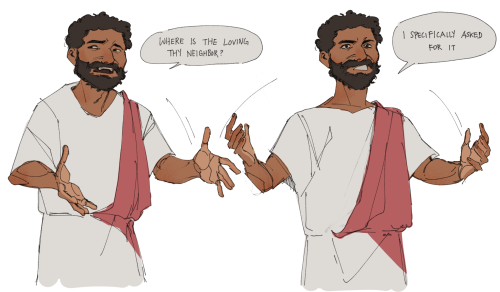“The Gospels Insist Upon Two Antithetical Truths Which Express The Tragedy Of The Human Condition:
“The Gospels insist upon two antithetical truths which express the tragedy of the human condition: the first is that if you do not love you will not be alive; the second is that if you do love you will be killed. If you cannot love you remain self-enclosed and sterile, unable to create a future for yourself or others, unable to live. If, however, you do effectively love you will be a threat to the structures of domination upon which our human society rests, and you will be killed.”
— Fr Herbert McCabe (via onancientpaths)
More Posts from Quovadisjeanne and Others
halos are fun but tbh realistically i think that saints would just have heads burning up with holy fire from the inside out. they'd be uncomfortable to look at, not only because they burn so bright and billow with smoke and flame, but because of the abjectly contradictory, miraculously terrible nature of it. headless but whole. dead yet alive.
God loves your body. Your intersex body, your transsexual body, your nonbinary body, your transgender body, your genderqueer body, your androgynous body. Whatever body you have, God loves it dearly.

Do you think Jesus ever felt homesick. Do you think he missed his mom
someone on Discord brought up Romans 1:26-27 and activated my autistic avatar state and I ended up writing a little essay that's basically a summary of the argument Daniel A. Helminiak makes that Romans 1:26-27 is not a condemnation of homosexuality or homosexual acts in his book What the Bible Really Says About Homosexuality
and I thought I'd share it here in case someone else is interested
it basically covers 3 main points:
1. what does Paul mean by things being natural or unnatural? 2. the distinction between impurity/uncleanness, and evil/sin. 3. the purpose and rhetorical structure of Paul's letter to the Romans.
keep in mind I am by no means an expert, this is just my summary of Helminiak's argument, which I happen to find very convincing. there's a lot of details and corroborating evidence left out here, if you want the full thing, I can recommend the book! I enjoyed reading it, and it also has interesting things to say about other 'clobber passages'
essay under the cut!
1. Unnatural, or contrary to nature?
So first, what does Paul mean when he calls things natural or unnatural? When we read these words nowadays, there is usually a strong moral value attached to them. When people call things 'unnatural', it means they violate some important law of nature, they are abhorrent and wrong and bad. There is, however, a lot of evidence that this is NOT how Paul uses the term (the Greek here being "para physin"). This is a term he uses many times in multiple letters, simply to mean that someone is doing something beyond what one would usually expect. It clearly has no inherent moral value to him, because he even says there are things God does that are "para physin"! So instead of 'unnatural and abhorrent and bad', we should read it more like: "contrary to her nature, Judy was super chipper this morning! she usually isn't a morning person", or "James is always so kind, but contrary to his nature, this morning he just snapped at me". In this case, by calling these acts "para physin", he is probably saying that these people are doing things that are against social norms and expectations, and/or that they are doing things that don't fit with their usual behavior.
2. Uncleanness vs sin
Second, we have the distinction between things being ritually unclean, and things being evil/sinful. Helminiak goes deep into the intricacies of Jewish law to support this point, but I'll just jump straight to the conclusion, and recommend that you read his book if you feel it needs more justification. Basically, the core is as follows:
- There are things that are considered evil, sinful, bad, morally wrong, for example murder, selfishness, exploitation of others, etc. - There are also things that are considered unclean, but not morally wrong. This is a lot of what is described in Leviticus, for example, and Helminiak uses this same distinction to clear up the infamous clobber passage from Leviticus about men lying with men. Now, these purity laws in the Pentateuch are not unimportant - when they were made, they were extremely important to the Jewish people to set them apart from others. These are the 'holy' laws after all, in the original Hebrew sense of the word meaning things that are different, set apart. They were extremely important for the formation and protection of the Jewish identity. - In many places in both Paul's writings and others' writings in the New Testament, it is made clear that this second set of laws, I'll call them purity laws, do not need to apply to gentile converts. Essentially, they are still highly respected as Jewish law, but they are not carried over to any non-Jewish people who follow Jesus because, once again, these are about the Jewish people and the Jewish identity.
This gives us a distinction between impurity (relevant specifically to Jewish people), and sin/evil (relevant to everyone). According to Helminiak, this distinction was also already accepted by Jewish people at the time, to be clear, so this is not something imposed in hindsight.
Paul uses this distinction in Romans 1. Verses 21-32 have the following structure: 21-25: These people worship idols instead of God! There are consequences to this.
26-27: They do things that are ritually impure/unclean, and also are socially unacceptable and frowned upon. They suffer public shame as a consequence.
28-31: Additionally, they do things that are evil/sinful, and for that, they deserve death.
So the stuff Paul says about homosexual acts, is separate from the things he condemns that are evil and sinful. There is no clear moral judgment about the homosexual acts here.
This leaves us with a question: if Romans 1:26-27 is referring to laws that are only relevant for Jewish people, and Paul is talking about non-Jewish people, why does he even bring them up??? To answer this, we have to proceed to our third major point.
3. The rhetorical structure of Paul's letter to the Romans
We have to consider in what situation Paul is writing this letter, and for what purpose. He is writing it to a congregation that is a mix of Jewish people and non-Jewish converts, and there is animosity between them. This was very common, and one of the major points of contention between these two groups of people was usually precisely the thing we just talked about: cleanness and uncleanness. For example, there was a lot of conflict around food, with the gentiles eating food considered unclean by the Jewish people, and the Jewish people being upset by that.
Paul's goal is to help them reconcile. But, Paul being Paul, he doesn't do this by saying "I wish I could bake a cake filled with rainbows and smiles and everyone would eat and be happy." No, he does this by saying "why do you look at the speck of sawdust in your brother's eye and pay no attention to the plank in your own eye?"
When we look at the rhetorical structure of the letter, we see that Paul does the following things: - Sympathize with the Jewish people to get them on his side. Because aren't these gentiles just gross and awful? - UNO REVERSE! Actually you, Jewish people, you also do things that you consider unclean, and things that you consider sinful! So stop judging - Sympathize with the gentiles to get them on his side. Because aren't these Jewish people so annoying? - UNO REVERSE! Shut up, you're no better than anyone else!
So by bringing up these unclean/impure things in 1:26-27, Paul is sympathizing with the Jewish people in the congregation to get them on his side, to get them listening to him, only so he can turn it around later.
It's like if I were trying to convince a loud conservative of something, I might do so by first sympathizing with them to get them on my side, so that then I can flip things. I could say: "Ah yes and these liberal snowflakes are so dramatic, aren't they? They are always overreacting to things, they make such a big deal out of tiny little things like which exact words you use. Right? Don't you think so? But look, see! You are no better! You also overreact and can be dramatic! Because you act like it's a huge burden to use the right pronouns for someone, like your rights are being taken away from you just because someone wants you to use they/them pronouns!"
So, now that we have examined all of this, I think it's safe to say: taken in context, these verses really aren't what they seem to be in isolation. And they are most likely not a condemnation of homosexuality or homosexual acts.
God comes through my open window every night, presses His body against mine, and tells me that love will destroy me if i let it; and i must let it. i go back to sleep
Living traditions constantly interpret their canonical texts. That is what makes fundamentalism — text without interpretation — an act of violence against tradition. In fact, fundamentalists and today’s atheists share the same approach to texts. They read them directly and literally, ignoring the single most important fact about a sacred text, namely that its meaning is not self-evident. It has a history and an authority of its own. Every religion must guard against a literal reading of its hard texts if it is not to betray God’s deeper purposes.
— Rabbi Lord Jonathan Sacks zt”l, in The Great Partnership: God, Science and the Search for Meaning
-
 wondermades reblogged this · 1 month ago
wondermades reblogged this · 1 month ago -
 mashedpotatojonze liked this · 1 month ago
mashedpotatojonze liked this · 1 month ago -
 purpleweredragon liked this · 1 month ago
purpleweredragon liked this · 1 month ago -
 unatomedebismuth liked this · 2 months ago
unatomedebismuth liked this · 2 months ago -
 noneuclidiangeometry liked this · 2 months ago
noneuclidiangeometry liked this · 2 months ago -
 ballerinafigurine reblogged this · 2 months ago
ballerinafigurine reblogged this · 2 months ago -
 ballerinafigurine liked this · 2 months ago
ballerinafigurine liked this · 2 months ago -
 jan-pipijan reblogged this · 4 months ago
jan-pipijan reblogged this · 4 months ago -
 crawlerr liked this · 4 months ago
crawlerr liked this · 4 months ago -
 quovadisjeanne reblogged this · 5 months ago
quovadisjeanne reblogged this · 5 months ago -
 rainyfey liked this · 5 months ago
rainyfey liked this · 5 months ago -
 eidolocene reblogged this · 5 months ago
eidolocene reblogged this · 5 months ago -
 vegetus-vox liked this · 5 months ago
vegetus-vox liked this · 5 months ago -
 deeplovelydark liked this · 5 months ago
deeplovelydark liked this · 5 months ago -
 driftglazz liked this · 5 months ago
driftglazz liked this · 5 months ago -
 freeandclear3567 liked this · 5 months ago
freeandclear3567 liked this · 5 months ago -
 themourninghallow reblogged this · 5 months ago
themourninghallow reblogged this · 5 months ago -
 grannileality reblogged this · 5 months ago
grannileality reblogged this · 5 months ago -
 grannileality liked this · 5 months ago
grannileality liked this · 5 months ago -
 gayleviticus reblogged this · 5 months ago
gayleviticus reblogged this · 5 months ago -
 theancientfootsteps reblogged this · 5 months ago
theancientfootsteps reblogged this · 5 months ago -
 theancientfootsteps liked this · 5 months ago
theancientfootsteps liked this · 5 months ago -
 nmogfilm liked this · 5 months ago
nmogfilm liked this · 5 months ago -
 cam24fan reblogged this · 5 months ago
cam24fan reblogged this · 5 months ago -
 cam24fan liked this · 5 months ago
cam24fan liked this · 5 months ago -
 autailome reblogged this · 5 months ago
autailome reblogged this · 5 months ago -
 helloviennacalling reblogged this · 5 months ago
helloviennacalling reblogged this · 5 months ago -
 poorrichardjr reblogged this · 5 months ago
poorrichardjr reblogged this · 5 months ago -
 poorrichardjr liked this · 5 months ago
poorrichardjr liked this · 5 months ago -
 comtedemoney reblogged this · 5 months ago
comtedemoney reblogged this · 5 months ago -
 vulnerasti-cor-meum reblogged this · 5 months ago
vulnerasti-cor-meum reblogged this · 5 months ago -
 vulnerasti-cor-meum liked this · 5 months ago
vulnerasti-cor-meum liked this · 5 months ago -
 thesongofrhiannon liked this · 5 months ago
thesongofrhiannon liked this · 5 months ago -
 lovesickallovermybedd reblogged this · 5 months ago
lovesickallovermybedd reblogged this · 5 months ago -
 prayersforpigeons reblogged this · 5 months ago
prayersforpigeons reblogged this · 5 months ago -
 catwingsthespatula liked this · 5 months ago
catwingsthespatula liked this · 5 months ago -
 blood-of-a-ghost liked this · 5 months ago
blood-of-a-ghost liked this · 5 months ago -
 angel-eterna reblogged this · 5 months ago
angel-eterna reblogged this · 5 months ago -
 gottesmutter liked this · 5 months ago
gottesmutter liked this · 5 months ago -
 prismaticbleed liked this · 5 months ago
prismaticbleed liked this · 5 months ago -
 buenamaquina reblogged this · 6 months ago
buenamaquina reblogged this · 6 months ago -
 the-beatch reblogged this · 6 months ago
the-beatch reblogged this · 6 months ago -
 prayersforpigeons liked this · 6 months ago
prayersforpigeons liked this · 6 months ago -
 christian-sideblog reblogged this · 6 months ago
christian-sideblog reblogged this · 6 months ago -
 lucymonster liked this · 6 months ago
lucymonster liked this · 6 months ago -
 thepinkaristocrat liked this · 6 months ago
thepinkaristocrat liked this · 6 months ago -
 tokaiju reblogged this · 6 months ago
tokaiju reblogged this · 6 months ago -
 clothingweapon reblogged this · 6 months ago
clothingweapon reblogged this · 6 months ago
20s. all pronouns. religious sideblog. greek orthodox. just a place to reblog stuff so as to not annoy my followers on my main @fluxofdaydreams
170 posts










